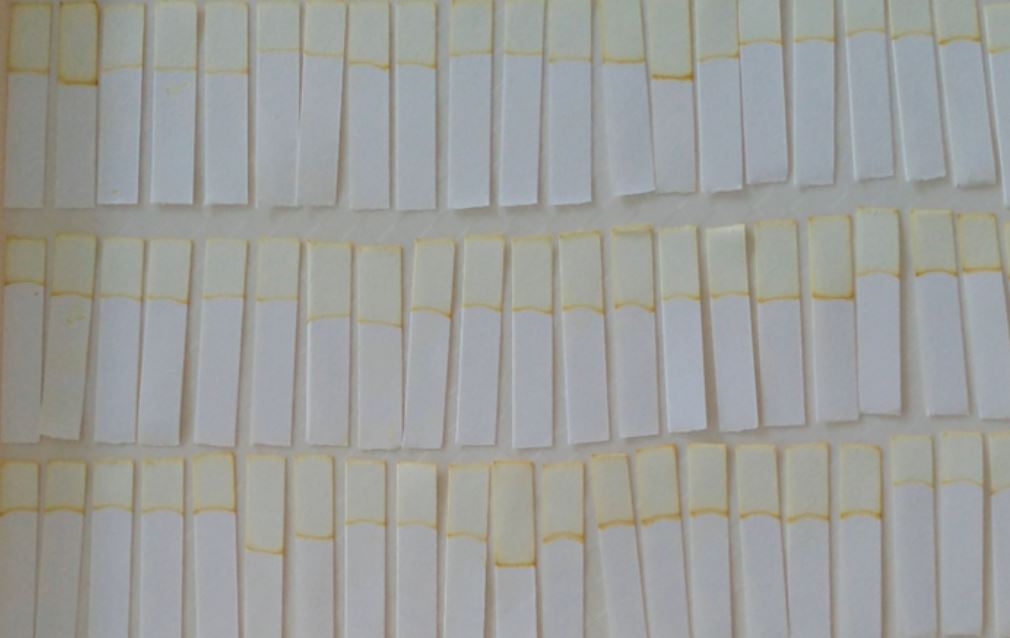
University of the Philippines (UP) researchers have developed a paper-based device that can be used as an alternative to the more costly conventional instruments used to measure the quality control of beverages.
The cheap, user-friendly, and robust paper-based device envisioned to help small and medium enterprises (SMEs) measure tea-based beverages’ health content was developed by Riann Martin O. Sarza, Casiana Blanca J. Villarino, and Cynthia Grace C. Gregorio of the Institute of Chemistry in the College of Science Department of Food Science and Nutrition, College of Home Economics at the University of the Philippines Diliman.
The UP device can be used in determining the total polyphenol content (TPC) specifically of sweet potato leaf extract (SPLE)-based tea beverage products.
In their study on “Paper-based Device for the Detection and Quantification of Total Polyphenols in Plant-based Beverages for Potential Use in Quality Assurance Purposes,” the state university team of researchers saw the need for local manufacturers to assess the polyphenol content of their products to ensure food quality.
“Without proper quality control, these enterprises are unable to export their products. That’s why there is a need to develop an inexpensive, robust, and easy-to-use quantification technique that SMEs may use to ascertain TPC in their products,” researcher Riann Martin Sarza said.
Polyphenols are compounds known for their health benefits, such as protection against heart disease, type-2 diabetes, and even certain types of cancer. It also aids in maintaining good digestion. And because the health benefits from polyphenols are commonly found in plants, market demand is increasing and so is the steady increase in the manufacture of polyphenol-rich, plant-based food products, especially beverages.
This paper-based device (PBD) developed by Filipino researchers can provide analysis while offering the advantages of simplicity in terms of fabrication and use, cost-effectiveness, and accessibility to users.
The SMEs and some large businesses sector in the Philippines often get discouraged from conducting proper quality control of their food products because the instruments used to determine TPC can be expensive, complex, time-consuming, and requires the skills of a trained analyst.
However, based on this research, the PBD not only matches the performance of its counterpart instrumental device but also exhibited that it is not prone to interferences caused by sugars and ascorbic acid. Further, under refrigerated storage conditions, the integrity of the PBD is kept intact and remains functional for up to 57 days.
“While the features of the PBD may still be improved, given its current performance, it can already be used in the quality control process of SMEs,” researcher Cynthia Gregorio said.
The simplicity, robustness, and inexpensiveness of the PBD ensure that the SMEs will have a cheap and accessible option to ascertain the quality of their products. Currently, the device is limited to the analysis of total polyphenols in SPLE-based and other tea-based beverages. Thus, the potential of the PBD to help improve the quality of beverage products sold commercially is big and will definitely benefit consumers.
The full discussion of this study, which was funded by the Science Education Institute (SEI) of the Department of Science and Technology (DOST) and the Philippine Council for Industry, Energy, and Emerging Technology Research and Development (PCIEERD)- DOST, can be accessed for free from the Philippine Journal of Science (PJS), February 2022 issue. PJS is the oldest science journal in the country, published by the Department of Science and Technology-Science and Technology Information Institute (DOST-STII).
University of the Philippines researchers and scientists have developed various innovations to address the COVID-19 pandemic since it broke out in 2020 including the first COVID-19 test kit made in the country and the RxBox health monitoring device.
Good News Pilipinas is a Lasallian Scholarum Awardee. TELL US your good news story tips by messaging GoodNewsPilipinas.com on Facebook, Twitter, Instagram, or e-mail editor@goodnewspilipinas.com and WATCH Good News Pilipinas TV YouTube & Good News Pilipinas TikTok for more Filipino Pride stories!










